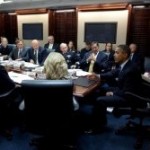Iran’s nuclear program has been making lots of headlines in recent months—and so has Israel, with multiple reports on a potential Israeli military strike against the Islamic Republic. An expert on Tehran’s nuclear ambitions feels that Israel-focus is incorrect.
Preventing Iran from acquiring nuclear weapons is “clearly the interest of the global community,” Dr. Emily Landau was quoted by The Israel Project as saying. “And not accepting this responsibility, not shouldering the responsibility I think is to the discredit of the international community. Allowing Israel, driven by its fears and frustrations, to be brought to the forefront of this dynamic is to the discredit of the international community.”
Landau, according to a transcript of her conference call hosted by The Israel Project and posted on their website, said Obama’s recent speech at AIPAC did note that stopping Iran is a security interest for the United States. However, she said that sentiment “needs to be amplified,” particularly news coverage of China and Russia’s failure to step up sanctions on Iran as the US and Europe have done.
Landau, senior research fellow at The Institute for National Security Studies (INSS) in Israel, did speak positively of the latest sanctions from the West, which have targeted Iran’s Central Bank and oil industry to the greatest degree yet.
Despite feeling that sanctions have not reached their max potential due to Russia and China’s lack of participation, Landau does apparently feel the measures have reached their max proportions.
“These are really the harshest economic sanctions that people have been talking about for years,” said Landau. “These are the crippling sanctions; these are the biting sanctions… So I think we’re at, you know, the most that can be expected from that route.”
Landau implied the next step for the international community is to step up the military threat rhetoric against Iran should they persist with their nuclear program. Included in that is her belief that the US should outline their red lines on Iran moving towards nukes, although she feels American rhetoric vis-à-vis Iran has been better overall.
“What would reassure Israel and at the same time deter Iran is if the administration gave clear red lines, red lines that are based on Iran’s action in the nuclear realm.”
As an example, she mentioned Iran enriching uranium as nuclear fuel beyond their current max levels of 20 percent—which would have no “plausible civilian use.”
Said Landau, “That could be a red line that would be an indication of Iran moving actually to nuclear weapons, but not waiting for some intelligence report that [Supreme Leader Ayatollah] Khamenei or another group of leaders had made a decision to actually construct nuclear weapons.”
The fact that Obama expressed his commitment that “containment” of Iran is not an option was also viewed as a positive by Landau, although she felt more clarity in definition, such as by stating red lines, is still needed. She also mentioned a new group of “like-minded” states becoming the chief negotiators with Iran, instead of the currently divided group that includes China and Russia.
As for Israel’s perspective on this matter, two leaders have appeared in the news of late: Prime Minister Benjamin Netanyahu and Defense Minister Ehud Barak. Landau felt their state of mind at this point is concern at Iran’s nuclear progress and a sense of responsibility to defend Israel, but not seeking a military confrontation.
“Perhaps what’s in their minds is, you know, a pressure tactic on the United States, but definitely not eager to use military force against Iran,” said Landau. “I think that would be my assessment, but genuinely concerned about the situation. Genuinely concerned that the international community is going to mess this up—is going to miss that last chance to stop Iran from crossing the line to a military capability.”
Ultimately Landau feels it’s the international community’s responsibility to keep that from happening.
“The pressure on Iran needs to be very strong sanctions, credible threats of consequences if Iran doesn’t get serious about negotiation,” said Landau. “And then you have at least the starting point for a more effective negotiation.”
(By Joshua Spurlock, www.themideastupdate.com, March 18, 2012)

